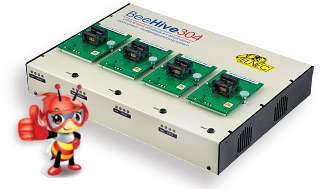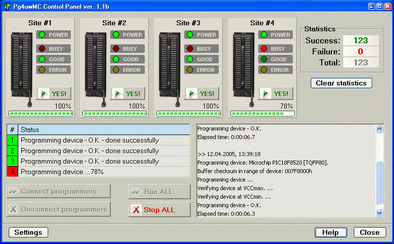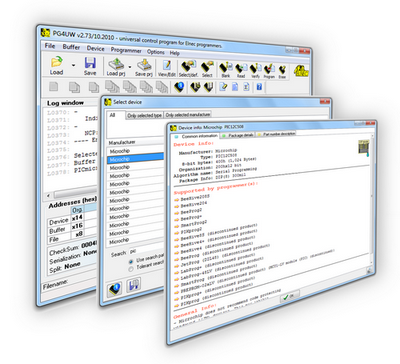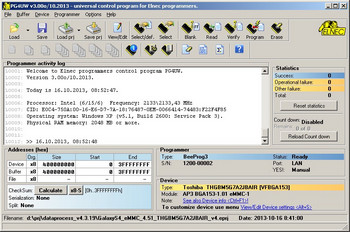崇贸烧录器 ,全自动烧录器,烧录面板,IC烧录 ,手动烧录器,烧录座维修,烧录器维修,烧录器租用,烧录座/适配器 T9600 T9800
13776093880

产品分类


BeeHive304
0.00
0.00
BeeHive304
(ord.no. 60-0062)
- four independent universal programming sites (BeeProg3 programming core based) in one unit
- the programmer perfectly fits for high-demanding desktop programming, as well as for automated programming systems
- based on a state of the art FPGA design, powerful ARM processor and internal SSD, the BeeHive304 is ready to program devices at theoretically possible speeds
- 4x 64-pins rich-features, precise and powerful pindriver provides programming signals for every technology of programmable devices
- it supports devices with VCC voltages as low as 0.8V
- ultra fast programming speed, one of the fastest programmers worldwide. Sustainable programming speed greater than 31 MBytes per second
- the 8 GB eMMC NAND Flash could be done in less than 250 sec, if supported memory is fast enough
- it utilizes both universal programming modules, dedicated for IC package type and specialized modules, designed optimized for specific device families
- ESD protection on each pins of the programming modules interface (pindriver and also supporting signals)
- dual connection to the PC: USB (2.0 HighSpeed) and LAN (up to 1 Gbit)
- comfortable and easy to use control program, works with all versions of MS Windows from Windows XP to Windows 10 (32-bit and 64-bit)
- two BeeHive304 units can be attached to one control PC to better utilize programming workplace
- implementation into available 3rd party automated programmers and ATE machines using simple remote control
- one software can serve up to 64 programming sites in one automated programmer (16x BeeHive304 programmers)
- unique quick reaction to customer's needs - software update can be ready within a day from request, by OnDemand software
- developed and made in Slovakia
- warranty - 3 years
-
approved by CE laboratory to meet CErequirements

-
GENERAL
- BeeHive304 is next member of Elnec concurrent universal multiprogrammer series, built to meet the strong demand for an extremely fast and reliable multiprogrammer for high-capacity memories.
- Designed with great emphasis on technical perfection and speed of hardware, this programmer perfectly fits for high-demanding desktop programming as well as for automated programming systems and ATE machines, where ensures the highest quality and overall yield.
- BeeHive304 consists of four independent isolated universal programming sitess, based on the BeeProg3 programming core hardware. Therefore the programming sites can run asynchronously (concurrent multiprogramming programming mode). Each programming site starts programming at the moment the chip is detected to be inserted in the socket properly - independently on the status of other programming sites. As a result, three programming sites works, while you are replacing the programmed chip at the fourth site.
- The BeeHive304 multiprogrammer supports as many chips, as the BeeProg3 programmer and without obvious decrease of programming speed because each programming site works independently. Also each programming site can program a different chip, if necessary.
- Because the BeeProg3 programming core is based on a state of the art FPGA, powerful ARM processor and internal SSD, BeeHive304 is ready to program devices at theoretically possible speeds. The achieved ultra fast programming speed - more than 31 MB/s sustainable - is actually higher, than can be utilized for most of real devices. This is reflected in extremely short programming times. For example, the 8 GB eMMC NAND Flash could be done in less than 250 sec - if programmed memory allow that speed.
- Tests show, that the BeeHive304 is currently faster than all competitors in this price category (status: 10/2015), and for many chips is the fastest at all.
- BeeHive304 supports all kinds of types and silicon technologies of today's and tomorrow's programmable devices. It partially supports also devices "from yesterday". You can be sure the next devices support will require the software update only, at the most (if necessary) simple programming module, therefore the costs of ownership is minimized.
- For the proper and reliable programming of ultra-fast memories the BeeHive304 utilizes specialized modules, optimally designed for specific device families, exactly according to the needs of programmed devices. But if it is possible, then universal programming modules, dedicated for IC package type, are used. The programming modules are identical for all programmers based on the BeeProg3 programming core.
- Programming modules construction is designed for perfect stability at the top of the programmer, to be tough enough for insert/replace chips by mechanical arm and also allows to keep identical position of ZIF socket also after replacing of the module.
- Modular construction of hardware - the programming sites works independently - allows for continuous operation when a part of the programming sites becomes inoperable. It also makes service quick and easy.
- The sensing circuits detect proper placement of device in the socket of programming module, which allows to begin programming immediately upon insertion of a chip. The operator merely removes the finished chip and inserts a new chip. Operator training is therefore minimized.
- BeeHive304 interfaces with any IBM PC compatible personal computers, running MS Windows OS, through USB (2.0 HigSpeed) port or LAN port (up to 1 Gb).
- Banana jack for ESD wrist straps connection to easy-to-implement the ESD protection control.
- With its very competitive price together with excellent hardware design for reliable programming, it is probably the best "value for money" programmer in this class.
HARDWARE (valid for each programming site)
- The 64-pin rich-features, precise and powerful pindriver of BeeProg3 programming core deliver high speed, accurate and clean waveform signals to the device by eliminating noise, ground bounce and overshoot, which maximizes programming yield and guarantees long data retention. This also allows the reliable support of virtually any nonvolatile technology used for programmable devices - (E)EPROM, Flash, MRAM, PCM, ... - by a single device programmer.
- FPGA based totally reconfigurable TTL pindrivers provide H/L/pull_up/pull_down and read capability for each pin of the device. The dual H/L drivers enables to provide two different H levels for both core signals and I/O signals of programmed device without additional logic. Programmer pindrivers operate down to 0.8V, therefore the programmer is ready to program the full range of today's and tomorrow's advanced very-low-voltage devices.
- Extremely fast programming, achieved by using FPGA based state machine, fast processor and SSD, allow execution of all time-critical routines and data transfers inside of the programmer.
- The programmer performs device insertion test based on the check of proper signal path between the programmer and programmed device before it programs each device. In dependence on programming configuration it identifies missed or poor contact between programmed device and the ZIF socket of the programming module, missed or poor contact between the programming module and the programmer and it's also able to indicate wrong position of device in the ZIF socket or the programming module (moved, rotated, backward oriented). These capabilities, supported by overcurrent protection and signature-byte check help prevent chip damage due to operator error.
- The selftest capability allows to run the diagnostic part of software to thoroughly check the health of the programmer.
- Built-in protection circuits eliminate damage of programmer and/or programmed device due to environment or operator failure. All the inputs of the BeeProg3 programming core - pins of programming modules interface (pindriver signls and also supporting signals), connection to PC and power supply input, are protected against ESD up to 15kV.
- The programming modules are available for devices in PDIP, PLCC, JLCC, SOIC, SDIP, SOP, PSOP, SSOP, TSOP, TSOPII, TSSOP, QFP, PQFP, TQFP, VQFP, QFN (MLF), SON, BGA, EBGA, FBGA, VFBGA, UBGA, FTBGA, LAP, CSP, SCSP, LQFP, MQFP, HVQFN, QLP, QIP and other packages.
SOFTWARE (production mode control SW: PG4UWMC)
- This part of the software is focused to the easy monitoring of high-volume production operations.
-
Operator-friendly control software combines many powerful functions with ease of use. Graphic user interface provide overview of all important activities result without burden of operator with non-important details.

-
There is used a project file to control the BeeHive304 multiprogramming system. Project file contains user data, chip programming setup information, chip configuration data, auto programming command sequence, etc. Therefore the operator error is minimized, because the project file is normally created and proofed by engineering and then given to the operator. The optional protected mode can be set for project file to avoid a unwanted changes of the project file.
- Each chip may be programmed with different data such as serial number, configuration and calibration information using rich-features serialization system.
SOFTWARE (programming sites driver, engineering mode control SW: PG4UW)
- This part of the software is focused to the quick and easy preparation of the project file for usage in the production mode control software.
- Each programming site is driven by a comfortable and easy-to-use control program with pull-down menu, hot keys and on-line help. It is the same years-proven software, as is used for all other Elnec single-site programmers.
-
Selecting of device is performed by its class, by manufacturer or simply by typing a fragment of vendor name and/or part number. Standard device-related commands (read, blank check, program, verify, erase) are boosted by some test functions (insertion test, signature-byte check), and some special functions (autoincrement, production mode - start of programming immediately after insertion of chip into socket).


- All known data formats are supported. Automatic file format detection and conversion during loading of file.
- The software also provides - in the Device information section - lots of information about the programmed device. As a special, the drawings of all available packages are provided. The software also provides explanation of chip marking (the meaning of prefixes and suffixes at the chips) for each supported chip.
- The rich-featured serialization function enables one to assign individual serial numbers to each programmed device - or simply increments a serial number, or the function enables one to read serial numbers or any programmed device identification signatures from a file and program it to programmed device.
- Jam files of JEDEC standard JESD-71 are interpreted by Jam Player. Jam files are generated by design software which is provided by the manufacturer of respective programmable device. Chips are programmed through JTAG (IEEE 1149.1 Joint Test Action Group) interface.
-
VME files are interpreted by VME Player. VME file is a compressed binary variation of SVF file and contains high-level IEEE 1149.1 bus operations. SVF files are interpreted by SVF Player. SVF file (Serial Vector Format) contains high-level IEEE 1149.1 bus operations. SVF files are generated by design software which is provided by manufacturer of respective programmable device. Chips are programmed through JTAG interface. VME files are generated by design software which is provided by manufacturer of respective programmable device.
Implementation into automated programming systems
- BeeHive304 programmer is ready for usage in the automated programming systems. The dimensions of programmer are reduced to technical minimum for this features&quality hardware in intent to minimize overhead of the handler's arm movement. The construction is mechanically stable to be immune against vibration during operation. The case of BeeHive304 is prepared to be fastened from top or from bottom of programmer body into automated programmer working place.
-
The BeeHive304 can be implemented into automated programmer (as a replacement of obsolete programmer for example) or into some handler using more ways:
- 1) if one or two BeeHive304 programmers are enough to do all job, then is enough to use one control PC for whole programming system, for both machine control and also programmer software. The BeeHive304 can be attached to this computer using USB or LAN port.
- 2) if more than two BeeHive304 programmers is necessary to implement into automated programmer, then more computers are necessary to use. Whole system is scalable up to 64 programming sites in one automated programming system by multiplying of BeeHive304 programmers and the control PCs. Maximal configuration comprise of 16x BeeHive304 programmers. One control computer in the system serve as a master unit. Here is running also multiprogramming control software, serialization engine and interface to the host system. Interfacing of control PCs in whole network is done over standard LAN.
- Implementation of BeeHive304 into software of automated programmers and handlers is by using of simple remote control of the PG4UWMC control software. There exist examples of implementation for standard programming languages and of course we are ready to help customer with this task.
13776093880

版权所有苏州浦旭电子科技有限公司 苏ICP备19066247号-1
可提供业务范围:崇贸烧录器 ,烧录器,全自动烧录器,烧录面板, IC代工烧录, IC烧录 ,手动烧录器,烧录座维修,烧录器维修,回收二手烧录器,二手烧录器出售,烧录器租用
